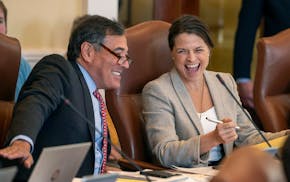(Updated)
Three senators and three House members, including the majority leader, will try to hash out a final medical marijuana proposal from significantly different plans passed by the House and Senate.
The Senate voted Tuesday morning to reject the House's version of the medical marijuana plan. That triggered a House-Senate conference committee, which will be charged with finding common ground. The House is favoring a more limited, research-based framework for medical marjuana, versus a Senate bill that includes a wider distribution network and a larger list of eligible patients.
The Senate negotiators will be Sen. Scott Dibble, DFL-Minneapolis, the bill's sponsor; as well as Sen. Tony Lourey, DFL-Kerrick, and Sen. Branden Petersen, R-Andover. The House negotiators include that chamber's chief sponsor, DFL Rep. Carly Melin of Hibbing. She'll be joined by House Majority Leader Erin Murphy, DFL-St. Paul, and Rep. Rod Hamilton, R-Mountain Lake.
It's somewhat unusual for a majority leader to sit on a conference committee, and Murphy's presence is likely to elevate an already high-profile issue. Gov. Mark Dayton has expressed his preference for the more limited House proposal, which has been greeted more warmly by law enforcement groups, but Dibble wrote in a letter to Dayton and Melin that he worries the House plan is "inadequate and unworkable."
Neither proposal allows marijuana to be smoked, but the Senate version gives patients access to marijuana in its plant form. The House proposal only allows the drug to be used in oil or pill form.
Both the House and Senate bills passed with bipartisan support. Right now, 21 U.S. states allow varying levels of access to marijuana for medical purposes.
The House-Senate conference committee has not yet scheduled a meeting. The last day lawmakers can meet in regular session this year is next Monday, meaning the group will have to negotiate with some haste.
Former Wisconsin Democratic Rep. Peter Barca announces new bid for Congress
The Latest | Jury selection enters a pivotal stretch as Trump's hush money trial resumes

